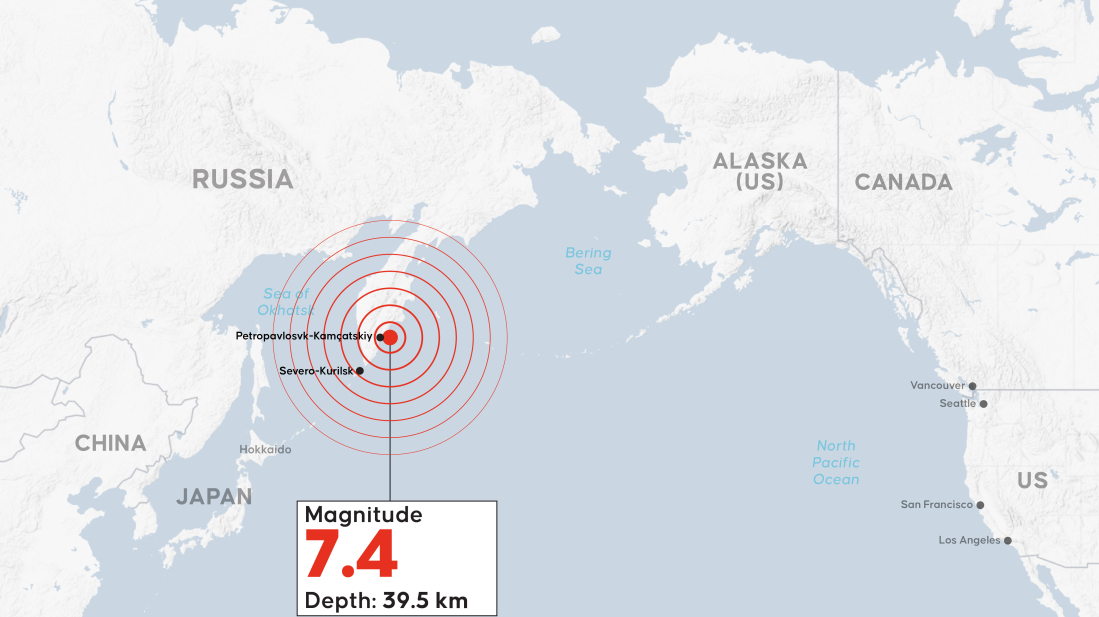live Israeli military says it has launched fresh strikes on Tehran: All the latest news on the Iran strikes
The Israeli military has begun a new wave of strikes on Tehran, it said late on Monday. The strikes came after it issued...

A powerful 7.4-magnitude earthquake struck off Russia’s Kamchatka Peninsula on 13 September with no tsunami threat, coming just weeks after the region endured a devastating 8.8-magnitude quake — the strongest since 1952.
The Pacific Tsunami Warning Centre in Hawaii initially warned of a possible tsunami after Saturday’s tremor on 13 September 2025, but later confirmed there was no risk. The U.S. Geological Survey measured the quake at 7.4 with a depth of 39.5 kilometres, while Germany’s Research Centre for Geosciences recorded it slightly lower at 7.1 with a depth of 10 kilometres. Broadcaster NHK reported that Japan’s Meteorological Agency also found no threat to its coasts.
Kamchatka shaken by powerful quake in July
The latest tremor follows the massive 8.8-magnitude earthquake of 30 July, which rattled Kamchatka and the Kuril Islands, prompting tsunami warnings as far away as Hawaii, Japan and Chile. Russian scientists described it as the most powerful quake to strike the region since 1952.
Scenes of chaos unfolded across the Far East. In Petropavlovsk-Kamchatsky, doctors continued surgery as the ground shook beneath them, with CCTV showing medics steadying both patient and equipment. The regional health minister said the patient survived.
Elsewhere, buildings trembled, debris fell from rooftops, and a fish processing plant was swept away by water rushing inland on Paramushir Island. Residents described moments of panic, with some fearing for their lives. Kremlin spokesman Dmitry Peskov reported no casualties in Russia, crediting strong construction standards and efficient alert systems.
Why Kamchatka is highly earthquake-prone
The Kamchatka Peninsula lies on the Pacific “Ring of Fire,” one of the world’s most active seismic zones, where the Pacific Plate collides with the North American Plate. This tectonic activity produces frequent major earthquakes and fuels more than 300 volcanoes across the region, nearly 30 of them active.
Because of its location, seismic events in Kamchatka can also trigger tsunami warnings across the wider Pacific, affecting distant coastlines. Scientists continue to warn of aftershocks in the weeks ahead, underscoring the peninsula’s vulnerability.
Follow the latest developments and global reaction after the U.S. and Israel launched “major combat operations” in Iran, prompting retaliation from Tehran.
Saudi Arabia’s state oil giant Saudi Aramco closed its Ras Tanura refinery on Monday following an Iranian drone strike, an industry source told Reuters as Tehran retaliated across the Gulf after a U.S.-Israeli attack on Iranian targets over the weekend.
The Kremlin is utilising the recent United States and Israeli military strikes on Iran to validate its ongoing war in Ukraine. Russian officials are pointing to the escalation in the Middle East as evidence that Western nations do not adhere to international rules.
The Middle East crisis intensifies after the deadly attack on the compound of the Supreme Leader of Iran Ali Khamenei on Saturday that killed him, other family members and senior figures. Iran has launched retaliatory strikes on U.S. targets in the region.
Ayatollah Alireza Arafi has moved into a pivotal constitutional role following the death of Supreme Leader Ayatollah Ali Khamenei, becoming the clerical member of Iran’s temporary leadership council under Article 111 of the Constitution of the Islamic Republic of Iran.
Canadian Prime Minister Mark Carney arrived in Australia on Tuesday (3 March), aiming to bolster relations between the two so-called "middle powers" amid what he has called a "rupture" in world order.
Former U.S. President Bill Clinton told lawmakers that President Donald Trump told him he had "some great times" with convicted sex offender Jeffrey Epstein before their relationship soured, according to a video released on Monday (2 March).
The U.S.-Iran crisis has entered its third day, with further strikes reported across the Middle East and the death toll rising. Oil prices have surged to levels last seen during the Covid-19 pandemic, raising fears of economic disruption and higher prices worldwide.
The UK said it's allowing the U.S. to use its bases for defensive strikes against Iran amid escalating missile attacks, after a suspected drone strike hit a British airbase in southern Cyprus, causing limited damage.
The Kremlin is utilising the recent United States and Israeli military strikes on Iran to validate its ongoing war in Ukraine. Russian officials are pointing to the escalation in the Middle East as evidence that Western nations do not adhere to international rules.
You can download the AnewZ application from Play Store and the App Store.

What is your opinion on this topic?
Leave the first comment